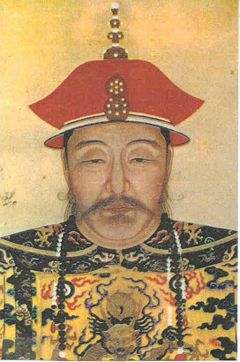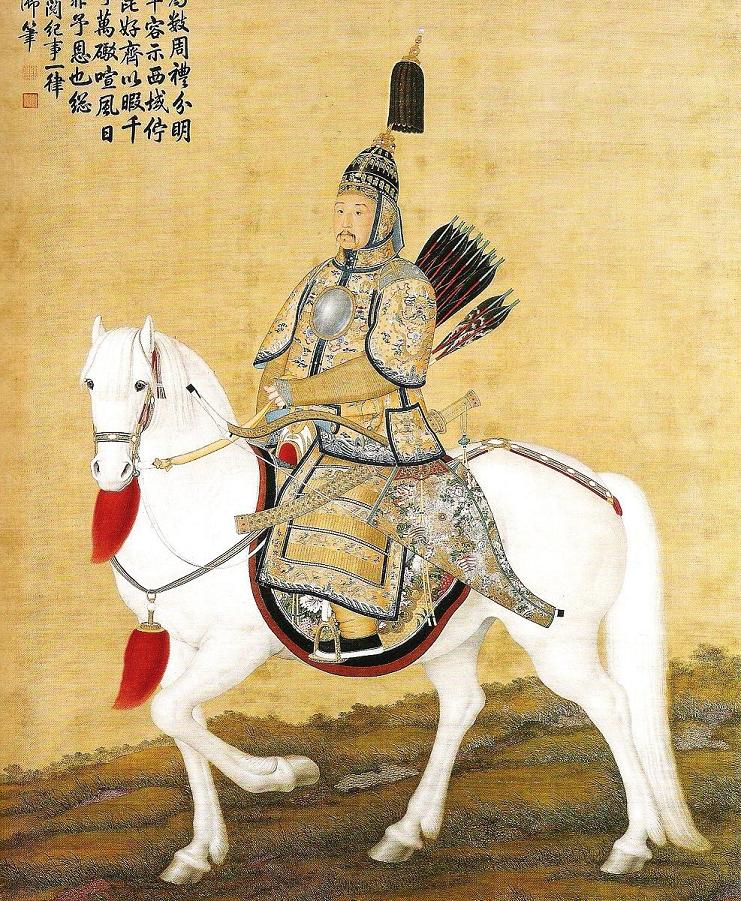Khan Nurhaci (1559-1626) (founder of the Jin state)
During the 1500's the Ming empire was likely at it's strongest; culturally and economically they outproduced Europe and those around them (paper, porcelain, lacquered paint). The Ming also had a prosperous system of urban and commercial society. They exported their wares to the other Asian countries and the Chinese language was used by scholars and diplomats across Asia. Their government bureaucracy functioned as part of a centralized government and so ensured the stability of the state. These are all things that would carry over to the Qing dynasty.
At around the same time the Ming had established a policy in Manchuria to control the Manchu tribes. They would side with certain tribes and fight other ones and economic control though exports to the tribes. A rival Jurchen Chieftain accused the Aisin Gioro tribe of disloyalty to the Ming and killed Nurhaci's father and grandfather (in 1582). Nurhaci then made war upon the rival tribes and conquered them all by 1616, declaring himself khan. Nurhaci also took the time to create a unified Manchurian language and borrowed the Mongolian script to write Manchurian. This also served as a cultural link to the neighboring Mongol tribes. Until his death in 1626 Nurhaci and his son Hong Taiji made war on the Ming dynasty for control of Manchuria but were not strong enough to attack China itself. Throughout the conquered regions in Manchuria Nurhaci enforced the separation of the Manchu and the Han Chinese as a result of Han Chinese revolts. The Han Chinese had to provide free service to the Manchu , were not allowed to carry weapons, needed to provide the Manchu with food (and so live on rations) and stayed in their own parts of the cities. A second revolt was met by the execution of the educated Chinese scholars that did not support the Manchu government. The Han Chinese were put into registered households with one Chinese leader and a Manchu official for each group. They were allowed to have 100 acres and 7 oxen on the condition that they returned 20% of the grain to the Manchu state. Upon his death his lands and titles were distributed to his most able sons and officers in the Manchu and Mongol custom.
Khan Hong Taiji (1592-1643) (the consolidator of the Jin state)
Hong Taiji became khan after his father's death and preferred to centralize the state for himself and his successors. He had reformed the structure of Manchu society into eight "banners" for the purpose of military organization as well with the most prestigious tribes placed into the first four banners, allied Mongol tribes and Chinese subjects were also given a place in the banner system. Hong Taiji also adopted the Confucian classics and Chinese scholars and artisans into his government and created a council system of ministers. He abolished the restrictions on the Han Chinese and instead instituted the Chinese civil service exams of the Ming. He also defeated the Koreans and received tribute from them as the Ming had done thus keeping Korea politically, economically and culturally within the Chinese sphere of influence.
This had changed by the 1640's however. The Ming Emperors were inactive in the government and much of the power was in the hands of bureaucrats. This led to corruption and failures in tax control which then led to a lack of funds for the military and desertion. Large amounts of Portuguese and Spanish silver entering the country brought inflation to the Chinese economy, making the Chinese economic base unsustainable and the paper money and copper coins worthless. Chinese gold and silver coins also decreased in value. The poor management of grains by the bureaucracies and poor weather together with exploitative contracts caused famines in China. Angered peasants resorted to banditry and became an army of rebels that attacked Beijing. The Ming emperor killed himself and the peasant leader declared himself emperor. The Manchu led by Dorgon (brother of Hong Taiji) invaded China and gained the support of the Ming general Wu Sangui to capture Beijing. Dorgon crowned his very young nephew as Emperor Shunzi of the Qing Dynasty. The Manchu and their Han Chinese allies pursued the Ming loyalists to the south and conquered China by the 1660's.
Prince Regent Dorgon (1612-1650) (the conqueror of Ming)
After conquering China the Manchu needed to administrate China. Dorgon inherited a hybrid system which was a mix of the Chinese government and the Manchu administrative system of the Eight Banners. He needed to adapt this to control of all China. He decreed that all subjects of the empire needed to adopt Manchu clothing and the Queue hairstyle to emphasize loyalty to Qing. Ming style eunuch control of bureaucracies and military offices was also removed and were given to officials instead. The six ministries of the Ming remained (civil affairs, finance, religion, war, justice and public works)and their ministers were appointed from any ethnicity by the civil service exams (Chinese organizations remained) although usually Manchu and Han officials were appointed in charge of these. For military purposes many officers were recruited from the Manchu and still used the Manchu language, although the majority of the army was Han Chinese, not organized into the Eight Banners and had their own officers. The military culture stayed mostly Manchu but these soldiers used the Chinese social customs (as did the Mongol bannermen) and traditional culture.
The Shunzhi Emperor (1638-1661) (the short lived ruler of China)
Early years of Qing had seen anarchy among the social classes; servants rioted against their masters, the townspeople fought peasants, subjects rebelled against the local officials, peasants looted the homes of the rich and the temples, soldiers and peasants mutinied and became bandits or pirates. The hereditary aristocracy was almost non-existent as it was known in feudal Europe (in China it was hereditary in the sense of property but not feudal rights of barons and princes). The upper classes were mostly made up of rich officials and those promoted by the state with money or agricultural land. There also existed those which were given court titles and special privileges and rights as well as money. But the best ways to advance one's position was still by the civil service exams. The Qing government promoted their loyal Han Chinese officials such as general Wu Sangui with titles and given control over southern provinces in order to administer them for the Qing. This system was called the "Three Feudatories". After the death of Emperor Shunzi his heir Kangxi faced a revolt by these three warlords and incorporated these lands into regular control. Kangxi conquered Mongolia, Taiwan and Tibet and were usually governed by local or tribal officials. However some officials stole much of the revenue or increased taxation without the Emperor's notice. Banditry was also a major issue in the rural areas and distant border lands where control could not be implemented fully.
The Kangxi Emperor (1654-1722) (longest reigning of the Qing monarchs)
A new tax system and land distribution helped the government to control revenues while providing the war torn regions with peasants to work the land and ending many of the abuses of the landlords. Taxes were collected and sent to imperial offices rather than remain with the local government, the court would leave enough to pay for the salaries of officials. Instead of raising taxes in relation to an increasing populace, people could register to receive plots of land to grow food and pay some kind of rent to the government in relation to how much they grew, this allowed the sustainability of the growing populace. Kangxi began a system of correspondence with any officials and encouraged them to send him reports of their work as well as any other information he might find helpful such as grain prices or any suggestions they might have in order to keep the Emperor informed and able to find corruption from one of his other officials. Another system of secret correspondence was used where the official sent his own official messengers to give the emperor classified information. Ownership of certain commodities like ginseng, salt and jade allowed for the emperor to personally receive a fortune from these sales. A national survey of all the land holdings in China was abandoned as the territory was too large to survey for personal properties and centralized tax system by the government would become more difficult in later decades because of this.
He was also kept informed about Catholic missionaries in China and had the leading priests sign a contract saying that the Emperor was in charge of what was taught, not the Pope. In exchange the Catholics were allowed to trade in China and create churches in China. The Qing used this as an opportunity to learn about certain scientific advancements put kept some science and philosophy secret from mainstream society. This was one of the first large scale interactions with western nations and foreign cultures within China proper. But it was not these foreigners which the Emperor was required to impress, look after and gain their trust but rather the Han Chinese, especially their intellectuals who could rally towards the Qing banners or turn against them and foment revolt.
to be continued...




















 Reply With Quote
Reply With Quote











